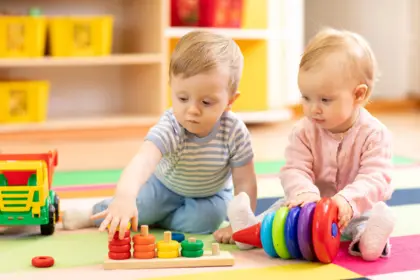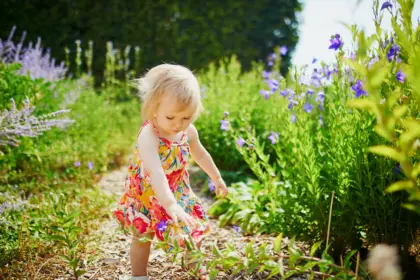13 - 18 Months
I can start to become more independent and expressive.
- Nature Walks: Take them on nature walks to explore leaves, flowers, and animals. This connection with nature can foster curiosity and a sense of wonder. Collect leaves, rocks, and flowers to examine together at home. Out & About Nature Activities for Kids and Families - Woodland Trust
- Simple Choices: Offer simple choices, like picking between two toys, to help them feel in control. Making choices can boost their confidence and decision-making skills. Let them choose their clothes or snacks. Tiny Happy People - Activities 12-18 month olds
- Story Time: Read picture books together and point out different objects and characters. Reading enhances language development and imagination. Ask questions about the story and encourage them to point to pictures. Bookstart | BookTrust
- Building Blocks: Provide building blocks to encourage creativity and problem-solving. Show them how to stack and build structures, and let them experiment on their own. Building Activities for Toddlers | Twinkl | Blog | EYFS
- Dance Party: Have a dance party with your toddler to encourage movement and rhythm. Play their favourite songs and dance together. Ultimate Kids Dance Party! 25 minutes +| Best Toddler Beats Songs Compilation
- Messy Play: Engage in messy play activities like finger painting or playing with playdough to stimulate their senses and creativity. Use washable materials and create a designated play area. Messy play for babies and toddlers: Edible messy play ideas - BBC Tiny Happy People

19 - 24 Months
I can start to develop a sense of self and others.
- Imaginative Play: Encourage imaginative play with dolls, stuffed animals, or toy kitchens. This type of play helps them understand different roles and scenarios. Create simple storylines and let them act them out. 10 Imaginative Play Activities Your Children Will Love - Early Years Resources
- Art Activities: Provide crayons and paper for drawing and colouring to express creativity. Artistic activities can improve fine motor skills and emotional expression. Display their artwork to show appreciation. 21 Ideas for Crafts with Toddlers | Pampers UK
- Social Interaction: Arrange playdates with other children to develop social skills. Interaction with peers is important for learning cooperation and empathy. Supervise and guide their interactions to encourage sharing and turn-taking. 40 Engaging Playdate Ideas for Toddlers and Little Kids
- Puzzles: Introduce simple puzzles to help them develop problem-solving skills. Start with large, chunky pieces and gradually move to more complex puzzles. 10 Puzzle Activities for Toddlers, Preschoolers, and Babies that Promote Learning - Speak. Play. Love
- Cooking Together: Involve them in simple cooking tasks like stirring or pouring ingredients. This can teach them about measurements, textures, and following instructions. Cooking with toddlers: Activity idea for 18 months - BBC Tiny Happy People
- Outdoor Exploration: Take them to parks or playgrounds to explore different environments and interact with other children. Encourage climbing, sliding, and running to develop their physical skills. Out & About
- Explore through repetition. Repeat favourite books, songs, puzzles, or routines. Be patient whilst you join in and show enthusiasm: “You remembered what comes next!” This helps to build memory, confidence, and deep understanding through practice.
- Push and pull box. Cut holes in a cardboard box and put objects inside to push or pull (e.g scarves, socks, small toys). Narrate their actions - “you pulled it out, now try pushing it in.” This develops fine motor coordination, problem-solving, and directional vocabulary.

25 - 36 Months
I can start to become more aware of my emotions and surroundings.
- Gardening: Involve them in simple gardening tasks like watering plants to connect with nature. Gardening can teach responsibility and care for living things. Let them plant seeds and watch them grow. Exciting Gardening Activities for Preschoolers | Twinkl | Blog
- Mindfulness: Teach simple mindfulness activities, like deep breathing or noticing different sounds. Mindfulness can help them manage emotions and develop focus. Practice deep breathing together and talk about how it makes them feel. Wellbeing activities for children - BBC Tiny Happy People
- Family Time: Spend quality time together, talking about their day and what they enjoyed. Sharing experiences can strengthen family bonds and improve communication. Ask open-ended questions to encourage conversation. Chatting and building sentences: 2 to 3 years - NHS Tiny Happy People - Activities for 2-3 year olds
- Craft Projects: Engage in craft projects like making collages or painting to encourage creativity. Use a variety of materials like paper, glue, and natural objects. 30+ Nature Art for Kids: Fun and Easy Arts and Crafts Ideas
- Outdoor Games: Play outdoor games like hide-and-seek or catch to promote physical activity. Create obstacle courses or play simple sports to keep them active. . Out & About
- Storytelling: Encourage them to tell their own stories using pictures or toys to elaborate their stories. Retelling a story with preschoolers - Activity for 3 year olds - BBC Tiny Happy People
- Follow their curiosity. If they show you bugs, trucks, or the moon - pay attention. This encourages self-directed learning and excitement about discovery. Lean into this by buying books or puzzles of things they show an interest in e.g “you love bugs don’t you?”
- Texture walk (barefoot or play with hands). Place trays or plastic sheets on the floor and cover with different materials (grass, sand, fabric, rice, sponges) and let your toddler explore the different textures. Say things like, “This one is soft,” or “that’s cold” or ask, “what does it feel like?” This encourages sensory development, descriptive language and attention to detail.
- Freeze toys in ice. Freeze small toys in ice cube trays, or in water balloons and give your toddler warm water and tools (spoon, dropper) to melt the ice. This enhances their understanding of cause and effect, science concepts and patience. Toys in Ice
By encouraging your baby or toddler to keep learning and exploring, you can help them develop a strong foundation for lifelong curiosity and confidence. Remember, every child is unique, so adapt these tips to fit your child's individual needs and interests.